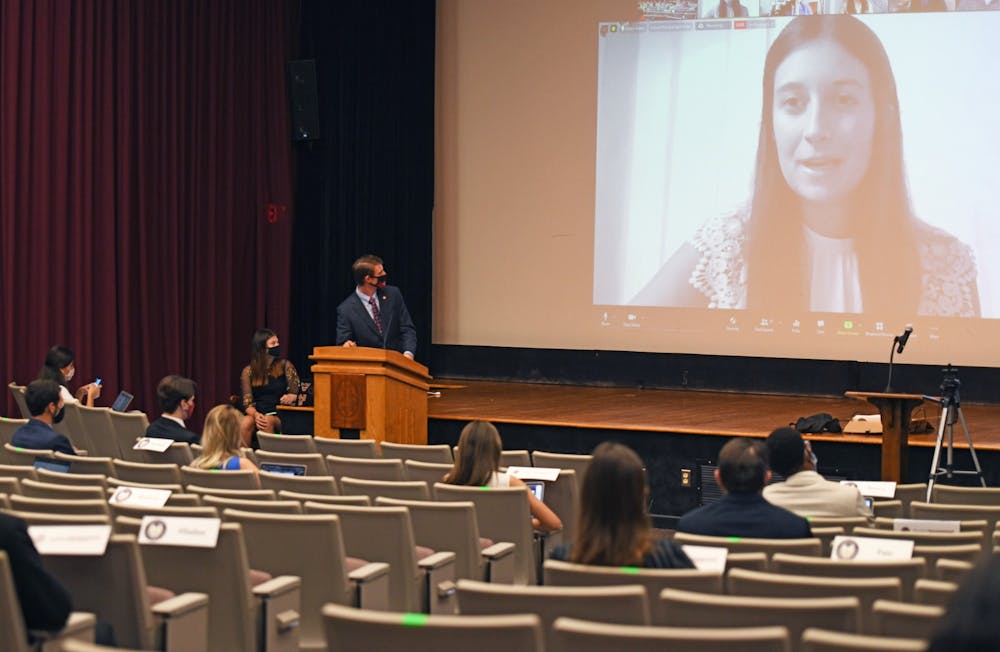The student senate discussed concerns about meal delivery and quantity of food for students in the quarantine and isolation dorms on Wednesday. Free speech on campus and the university's preparation for COVID-19 was also addressed.
Student Body President Issy Rushton hit on both issues, first providing information about the state of those quarantined in Bates West and the National Advocacy Center.
Quarantined students had been having issues with both the quantity and timeliness of food being served, Rushton said, with some students receiving food several hours after regular meal times.
“I brought that to the attention of numerous administrators a couple days ago, and I've had further conversations since then. It is to my knowledge that it is being amended as we speak,” Rushton said.
Additionally, Rushton said, each quarantined student has been assigned a case manager, who they have direct contact with while in quarantine.
While the ratio of case managers to quarantined students is unknown, Rushton said that “the university is dedicated to making sure that students can have good access to case managers.”
Rushton also discussed preliminary plans for a task force surrounding freedom of speech following last week’s anti-Black Lives Matter protests on campus.
This effort, which may include a public forum with administrators, Rushton said, could help address a “gap of communication” between students and administrators.
“I think the instigators that came recently weren't just targeting one minority group. There were so many experiences and so many feelings that came with each minority group that they were targeting,” Rushton said. “When there are so many experiences and so many stories to tell it's hard to reach every single one.”
Rushton also clarified that the instigators, who were not wearing masks, were not in violation of the university’s COVID-19 mask policy, as the policy only recommends masks be worn outdoors but requires them indoors.
A resolution supporting the repeal of the South Carolina Heritage Act, which prevents the renaming of buildings and historical markers in the state without the approval of the state legislature, was brought forward by student senator McKenzi Norris.
Norris said local communities in the state should be able to decide what names they display on monuments and buildings.
“USC should be no exception," Norris said.
Norris also expressed support that if the act were repealed, that the University would “take the opportunity . . . to rename some of their buildings.” The senate has specifically named Sims and Wade Hampton residence halls, the Gen. Robert E. Lee Memorial Tree and the Strom Thurmond Wellness and Fitness Center in the resolution.
Additionally, student senator Morgan McDonald introduced a recommendation that Associated Student Organizations (ASOs) publicize their budgets.
ASOs, such as club sports and Garnet Media Group, receive funding from the University through students’ campus activity fees.
Although publicizing these organization’s budgets had been a focus for some time, McDonald said that COVID-19 was the motivation for the recommendation’s creation.
“I think it’s a perfect time to just start looking into these fees, especially because I know that we’re entering a little bit of a financially difficult time for just every person,” McDonald said.
During open discussion, Speaker Pro Tempore Sawyer McDuffie spoke to “dispel any misconceptions” regarding the university’s handling of COVID-19 cases on campus.
“I think a lot of people think that the university is just not prepared, they think they've squandered the last five months and not done any preparation, but that's just untrue,” McDuffie, a third-year political science student, said.
Specifically referencing the vandalism found on Russell House earlier in the week, McDuffie called the spreading of misinformation a “sad stain” on our campus.
“We are under perfect circumstances where we knew this was going to be the outcome and we’re being 100% able to handle the caseload that we have at the moment,” McDuffie said.
McDuffie said that this comment referred to the variety of the university’s plans for COVID-19.
“It would be naive to say that no cases were going to occur, zero caseload, but the university has what they call their levels of alert, and they knew, they're not dumb, they know cases are going to happen,” McDuffie said.

